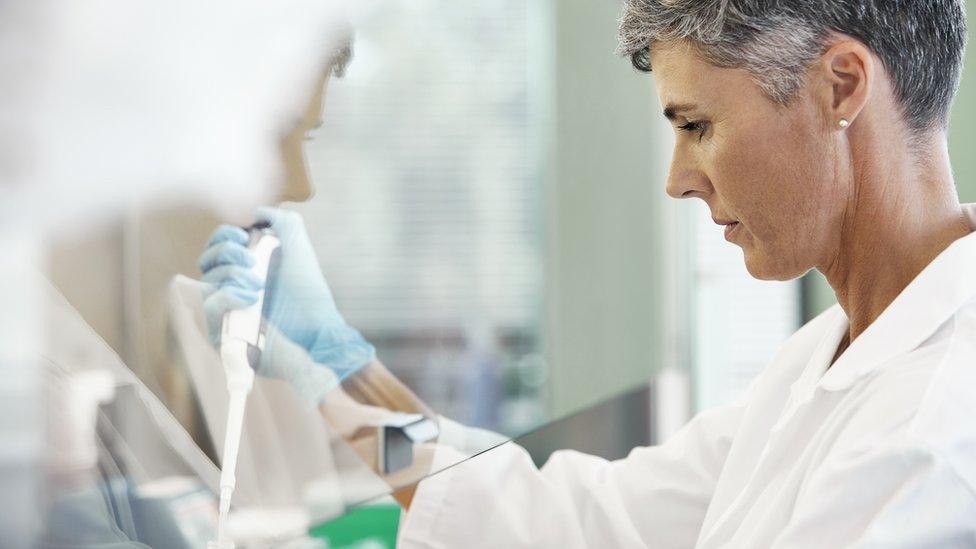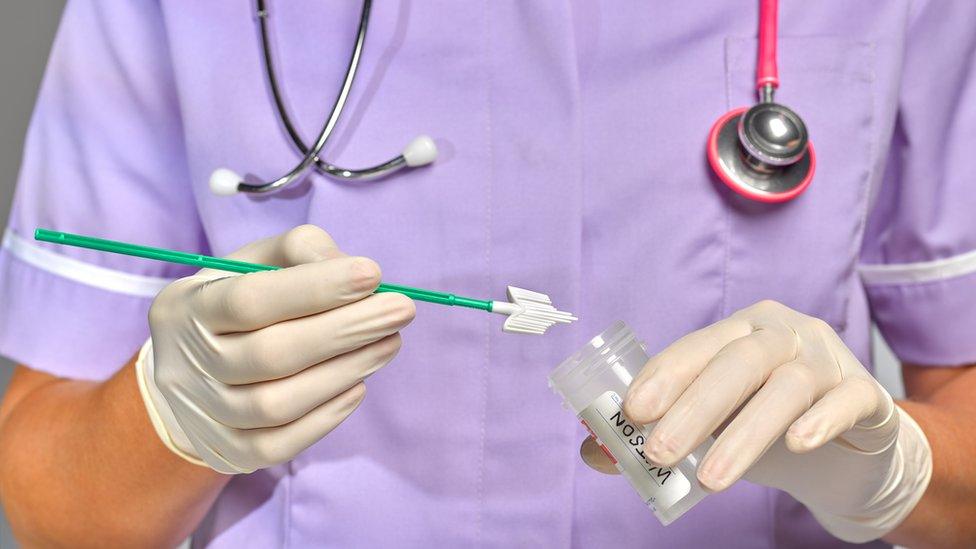Covid in Scotland: Cancer diagnoses fell 40% at start of pandemic
- Published

The number of people diagnosed with cancer fell by 40% at the start of the Covid pandemic, according to public health statistics.
Public Health Scotland (PHS) figures indicate cancer diagnoses fell by about 4,000 between March and June when compared with the previous year.
The number of patients diagnosed between January and March were similar to the same period in 2019.
But from March the figure dropped by about 40%.
Overall the total number of diagnoses between January and the end of June fell 19% on the same period the previous year.
Public Health Scotland said the drop was likely to be down to a combination of factors.
These included patients with possible symptoms not going to their GP - perhaps because they were concerned about catching Covid.
Changes to screening programmes and a reduction in diagnostic services and treatments available may also have contributed.
PHS added that the coronavirus had caused "substantial direct and indirect harm" across the country.
During her daily briefing, First Minister Nicola Sturgeon was asked to comment on the likely under-reporting of cancer cases during the pandemic.
She insisted that if restrictions had not been put in place, Scotland would be facing deaths "many, many times" the 5,135 fatalities officially recorded.
However, she added: "We have always acknowledged that lockdown restrictions do other harms which is why we have the four-harm analysis of any restrictions that we have.
"Anybody who is worried at all about symptoms that could be indicative of cancer should see your GP.
"Don't hold back from seeking advice. It is important that you know the health service is there for you."

Cancer in Scotland

There are usually about 34,000 cases of cancer diagnosed each year in Scotland.
Lung cancer is the most common (more than 5,300 cases), although breast (about 5,100) is the most common in females and, in males, it is prostate cancer (about 4,200). Bowel (colorectal) cancer is the fourth most common cancer (about 4,100). These four major cancers account for 60% of all cancers diagnosed in Scotland.

'Huge efforts'
Interim deputy chief medical officer Dr Dave Caesar said between February and April, the NHS in Scotland faced being overwhelmed, causing a "disproportionately high mortality rate across the population".
He added: "Fortunately we didn't see that, largely down to the huge efforts in repurposing large areas of our health service, so that is a success story.
"With that there is an acknowledgement that we haven't been able to do some of the things in the way we would've liked to have done, especially around cancer and other services.
"The good news is that, since June, we have been able to remobilise many of these services. In fact, referrals for cancer investigation and treatment are now at 110% the level that they were pre-Covid."
'Hugely worrying'
Prof David Morrison, of the Scottish Cancer Registry, said: "The reduction in cancer diagnoses this year gives us a sense of the scale of the impact of Covid-19 on all stages of the journey from first seeking help to recovering from treatment.
"If you're worried you might have cancer, see your GP and get checked out. It's probably not cancer - but if it is, the sooner you're diagnosed, the better your chances of successful treatment."
Cancer charities have raised concern about the figures, stressing the importance of early diagnosis and treatment.
Marion O'Neill, of Cancer Research UK, said it was "hugely worrying but sadly not surprising".
The Scottish government must also address the backlog of people waiting for tests, she said, and ensure that healthcare workers are routinely tested for Covid to make the public feel safe.
"We're concerned that even if people are going to the GP, if they are not receiving follow-up diagnostic tests in good time, many more cancers will be diagnosed at a late stage when they're harder to treat," she added.
Kate Seymour, of Macmillan Cancer Support, said the figures showed a "staggering" drop.
"The Scottish government must ensure the cancer care system has the resources to diagnose and treat thousands of additional people, many of whom may have more advanced cancers than would normally be expected due to the delays," she said.